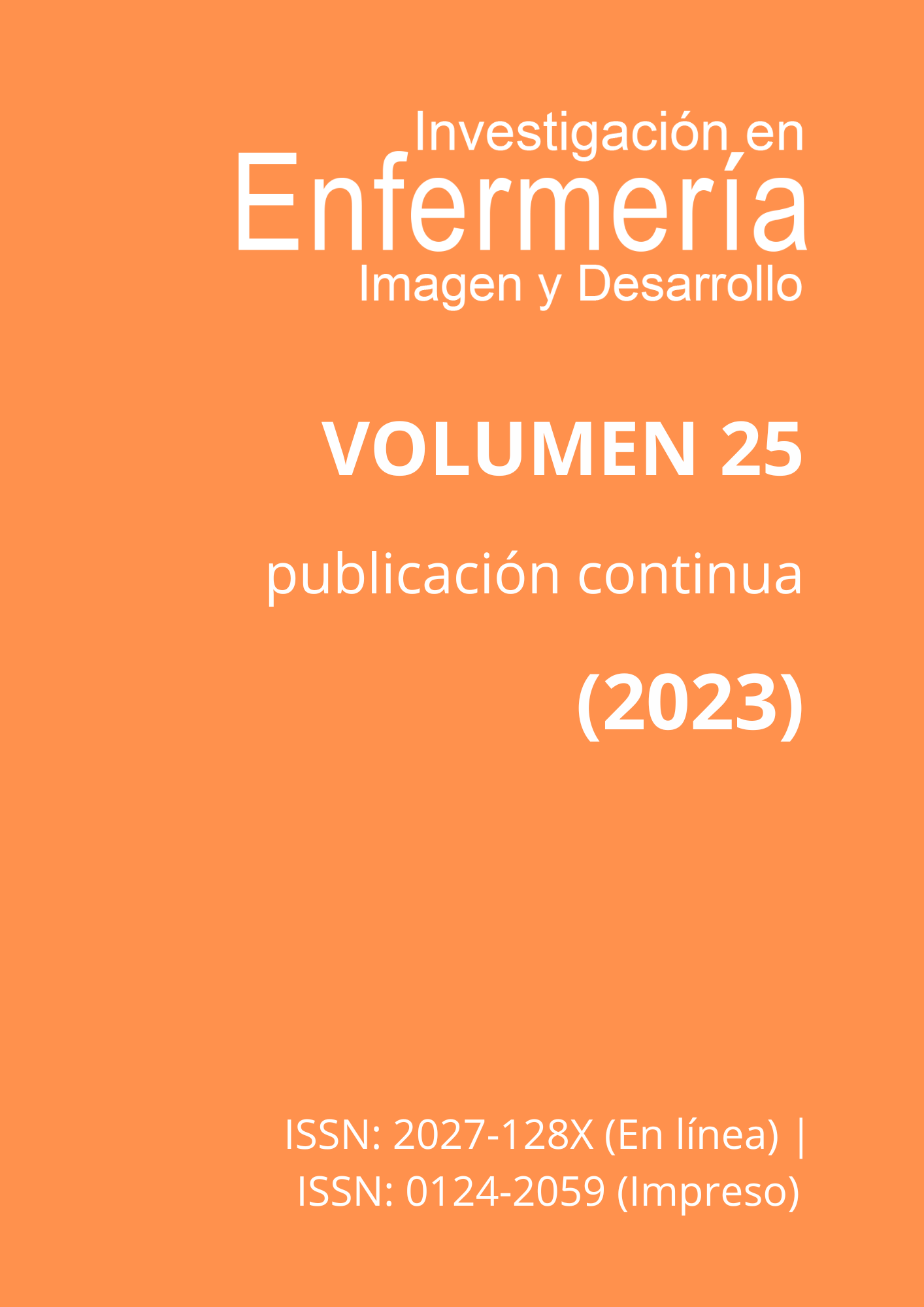Beliefs and Self-Care Practices in ICU Nurses During the COVID-19 Pandemic
##plugins.themes.bootstrap3.article.details##
Abstract
For nursing professionals, the COVID-19 pandemic exacerbated the need to put care and self-care into practice as fundamental elements to protect their lives, that of their patients, relatives, and social health in general. Objective: To describe the self-care beliefs and practices used by nursing professionals who work in Intensive Care Units to maintain physical, mental, and social well-being during the care of the COVID-19 pandemic between the second period of 2020 and the first period of 2021. Methodology: Qualitative ethnographic approach, based on the ethno-nursing method proposed by Madeleine Leininger. Sampling by theoretical saturation of 14 key informants was carried out. Collection of information was doner through semi-structured face-to-face and virtual interviews, recorded, fully transcribed, and field notes. Analysis of information through the phases of ethno-nursing, categorization, characterization and identification of recurring patterns. Results: Three categories were identified as main themes, information was obtained on the beliefs and self-care practices of nursing professionals during the COVID-19 pandemic that have repercussions on the search for individual and collective well-being, recognizable through the implementation of different strategies of protection and associated cultural practices. Conclusion: The thoughts and consequent actions mentioned by the interviewed population respond directly to the practices and beliefs related to their intentions to reduce the probability of contagion and manage self-care in the construction of resilience and effective well-being of health professionals nursing.
cross-cultural nursing, coronavirus infections, social values, self-care, intensive care unitsenfermagem intercultural, infeções de coronavírus, valores sociais, autocuidado, unidades de cuidados intensivosenfermería transcultural, infecciones por coronavirus, valores sociales, autocuidado, unidades de cuidados intensivos
1. World Health Organization. Coronavirus Disease (COVID-19 ) Outbreak : Rights , Roles and Responsibilities of Health Workers , Including Key Considerations for Occupational Safety. World Heal Organ [Internet]. 2019:1-3. Available from: https://www.who.int/docs/default-source/coronaviruse/who-rights-roles-respon-hw-covid-19.pdf?sfvrsn=bcabd401_0
2. Luo M, Guo L, Yu M, Jiang W, Wang H. The psychological and mental impact of coronavirus disease 2019 (COVID- 19 ) on medical staff and general public – A systematic review and meta- analysis. Psychiatry Res. 2020;291(January):1-9
3. Banerjee D, Rai M. Social isolation in COVID-19: The impact of loneliness. Int J Soc Psychiatry. 2020;66(6):525-7.
4. Motta CL, Muneva RY. La enseñanza de enfermería: un camino de participación materna del cuidado de prematuro hospitalizado. Cultura de los Cuidados. 2019;23(55):155-170. Available from: http://dx.doi.org/10.14198/cuid.2019.55.14
5. Leininger M, McFarland M. Culture care diversity and universality. New York: Jones and Bartlett Learning; 2006.
6. Padilha M, Borenstein M, Santos I. Enfermagem: história de uma profissão. San Cayetano del Sur: Difusión Editoria; 2015.
7. García-Alegría J, Gómez-Huelgas R. Enfermedad COVID-19: el hospital del futuro ya está aquí. TT Rev clin esp (Ed impr) [Internet]. 2020;220(7):439-41. Available from: https://dx.doi.org/10.1016/j.rce.2020.05.010
8. Bueno Ferrán M, Barrientos-Trigo S. Cuidar al que cuida: el impacto emocional de la epidemia de coronavirus en las enfermeras y otros profesionales de la salud. Enfermería Clínica. 2021;31(January):S35-9.
9. Herenas AD, García B, Garay J. Intervención educativa con enfoque transcultural en el cuidado de la persona con problemas de cronicidad. México, D.F: Eidec Editorial; 2020.
10. Hernández Sampieri R, Férnandez Collado C, Baptista Lucio P. Metodología de la Investigación. Sexta ed. México D.F.: Hill MG; 2014.
11. Melguizo Herrera E, Alzate Posada ML. Creencias y prácticas de cuidado de la salud de ancianos. Av en Enfermería. 2010;28:61-72.
12. Halonen JI, Erhola M, Furman E, Haahtela T, Jousilahti P, Barouki R, Antó JM. La Declaración de Helsinki 2020: Europa que protege. The Lancet Planetary Health, 2020;4(11): e503-e505. DOI https://doi.org/10.1016/S2542-5196(20)30242-4
13. Vicente F. La atención y coordinación sociosanitaria : hacia una nueva cultura del cuidado Social and health care coordination : towards a new culture of care. Enfermería Clin. 2020;30(January):291-4.
14. Gutiérrez SCH, Zumaeta LMM, Alvites SVR, Rojas LZS, Manchay RJD, Muñoz ST. Sentimientos de los profesionales de enfermería frente a la COVID-19. Rev Cubana Enferm [Internet]. 2022;38(0). Available from: http://www.revenfermeria.sld.cu/index.php/enf/article/view/5094
15. Luo M, Guo L, Yu M, Jiang W, Wang H. The psychological and mental impact of coronavirus disease 2019 (COVID- 19 ) on medical staff and general public – A systematic review and meta- analysis. Psychiatry Res. 2020;291(January):1-9. Available from: 10.1016/j.psychres.2020.113190
16. Price S. Nursing self-care in the time of COVID. Hear Lung. 2020;49(5):5-8. Available from: https://doi.org/10.1016/j.hrtlng.2020.06.007
17. Galleguillos Rodríguez PA, Godoy Delard MA, Vega Babich C. Intervención en salud mental en una UCI pediátrica: programa para enfermeras y auxiliares paramédicos. Santiago de Chile: Universidad Andrés Bello; 1997.
18. Reina-Leal LM, López-Díaz L. Entrelazando la compasión y la competencia cultural en hospitalización: una revisión de experiencias. Cultura de los Cuidados. 2020;24(58):136--153. Available from: https://doi.org/10.14198/cuid.2020.58.13

This work is licensed under a Creative Commons Attribution 4.0 International License.


